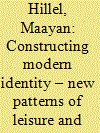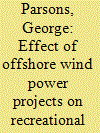| Srl | Item |
| 1 |
ID:
124451


|
|
|
|
|
| Publication |
2013.
|
| Summary/Abstract |
This article reviews the ways in which class, status, social mobility and their cultural ramifications have been considered (or failed to be considered) in recent ethnographic studies of the Islamic Republic of Iran. It argues against the trend of privileging "resistance" to an oppressive state as a theoretical frame for documenting social phenomena in Iran: lifestyles and consumption patterns cannot be interpreted merely as signs of political rebellion because they are endowed with symbolic value as status attributes in a society whose class configurations are shifting. I present a number of sources and concepts that help to rethink these phenomena, and show how the experience of Afghan refugees living on the margins of Iranian cities illuminates both the opportunities and constraints created by the Islamic Republic's uneasy mix of political Islam, populism and neoliberalism. A focus on aspiration to upward mobility becomes a useful analytical lens that allows us to sidestep reductive dichotomies such as tradition/modernity or religion/secularism that are in practice blurred by its very pursuit.
|
|
|
|
|
|
|
|
|
|
|
|
|
|
|
|
| 2 |
ID:
165588


|
|
|
|
|
| Summary/Abstract |
This article explores the cultural transformation that unfolded in urban centres in Palestine during the British Mandate period. Focusing on the city of Haifa as a case study, the article sheds light on how imperial colonial interests prompted massive development of the city that triggered significant cultural changes. The article examines the ways in which different groups in Palestinian-Arab society were involved, and how they initiated, experienced and reacted to the cultural shifts. The rapid increase in the number of cafés, cabarets, bars and restaurants constituted the cornerstone of the commercial entertainment industry in Haifa during this period. By delineating the emergence of new entertainment patterns and recreation habits, the article shows how leisure became a central component in the daily lives of varied social groups. It argues that leisure played a major role as an agent of modernisation and functioned as an essential site for the construction of modern personhoods in Palestinian society.
|
|
|
|
|
|
|
|
|
|
|
|
|
|
|
|
| 3 |
ID:
176883


|
|
|
|
|
| Summary/Abstract |
We use contingent-behavior data from a stated-preference survey to estimate the effect of offshore wind power projects on recreational beach use on the East Coast of the United States. The data are from an internet-based probabilistic sample of beachgoers (n = 1725) visiting beaches from Massachusetts to South Carolina in 2015. The contingent-behavior data are based on responses to visual simulations of wind power projects at seven different distances offshore (2.5–20 miles) in clear and hazy conditions and at night. We consider the effect on beach enjoyment/experienceand trips taken to a beach. As expected the nearer the projects are to shore, the greater their negative effect. For example, at 2.5-miles offshore, 29% of the sample state they would not visit the beach compared to only 5% at 20-miles offshore. Offsetting the negative effects, we also find evidence of potentially a large numbers of curiosity trips to view offshore wind power projects.
|
|
|
|
|
|
|
|
|
|
|
|
|
|
|
|